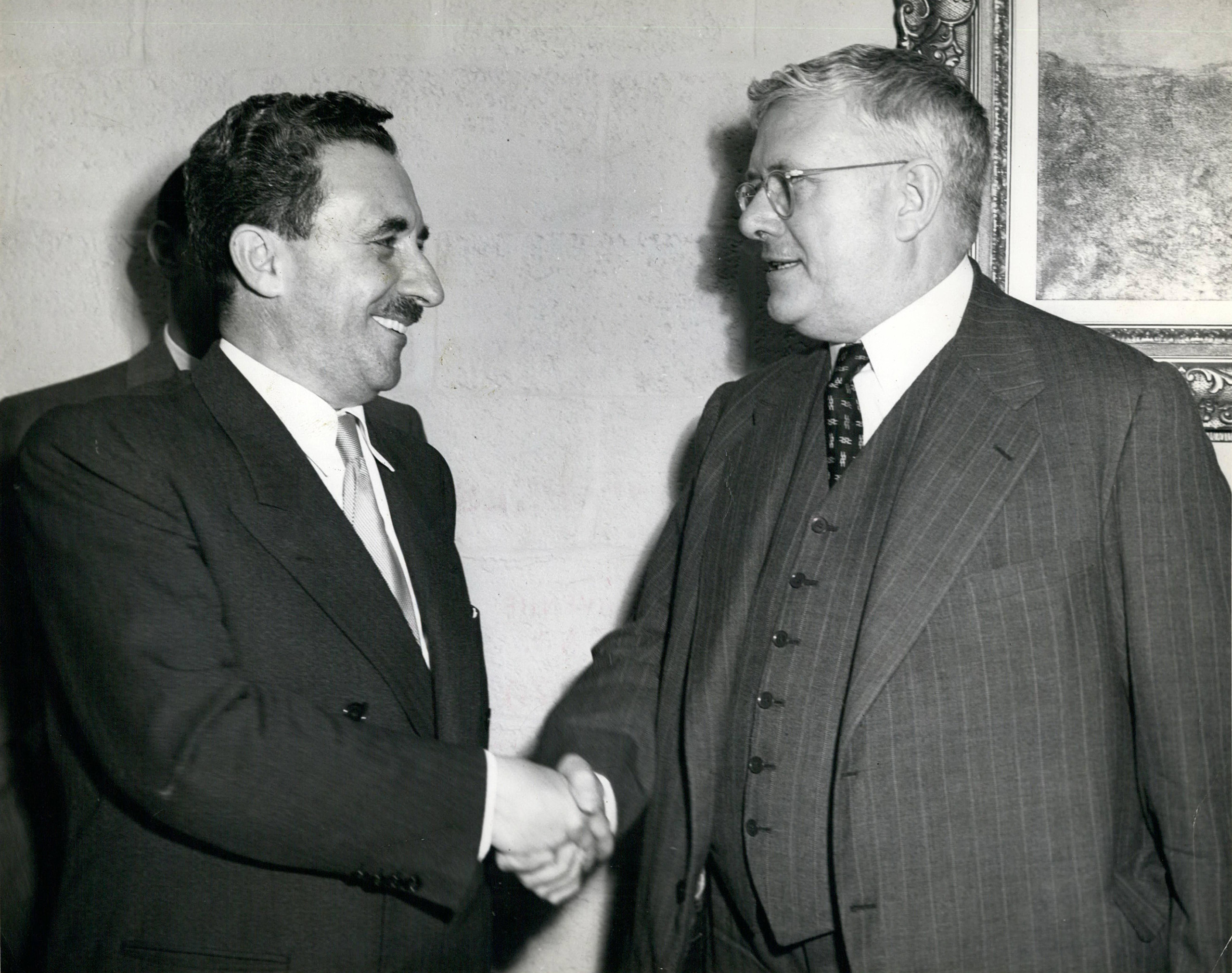Labor’s complex relationship with Palestine — its in-principle support for a Palestinian state versus its ties to an Israel of the party’s imagination that no longer exists — has been decades in the making.
History hangs heavy on Labor’s relationship with Israel. Its foundational support for Israel; its traditional ties to Israel’s labour movement; its alignment with Israel’s social democratic values; its connections to a Jewish establishment — none of these is reflected in the sort of country Israel has become.
Labor’s two great champions of the Jewish state, 1940s external affairs minister Bert Evatt and 1980s prime minister Bob Hawke, would have difficulty recognising the proto-nationalist settler state of today. Indeed, Hawke’s attachment to an Israel dominated by the labour movement for its first three decades had begun to dissipate towards the end of his life.
Behind the scenes, he used his influence in 2012 to persuade prime minister Julia Gillard to allow Australia to abstain rather than oppose a vote to give Palestine observer status at the United Nations. Gillard resisted tooth and nail, to the point where she risked alienating much of caucus. Her decision to appoint a senior member of her staff as an “envoy” to the Jewish leadership in Australia baffled colleagues.
Whether Anthony Albanese and his frontbench like it or not, they won’t be able to separate themselves from the complexities of an issue that animates a big — and growing — section of the Australian population.
Concern about the Palestine question is not restricted to members of the Muslim faith: a large non-Muslim constituency within Labor’s rank-and-file is also exercised by the issue. Beyond the party’s footsoldiers, concern is widespread, especially among younger members of the voting public who were already drifting towards the Greens.
Put simply, Labor’s fumbling response to the Gaza war has exposed deep-seated contradictions for all to see in the party’s policies towards Palestine. On one hand Labor’s espouses its support for two states, one Palestinian, one Israeli; on the other, it indulges Israeli policies that sabotage any prospect of compromise. This is Labor’s “two state confusion.”
Whatever else might be said, the Palestine issue is now indelibly embedded in Australian domestic politics. Graphic television images of death and suffering in Gaza are heightening public sensitivity. Senator Fatima Payman’s stand in support of recognition of Palestine drew attention to an issue that has moved decisively from the margins of politics.
Payman might be dismissed as a political ingénue not sufficiently marinaded in the traditions of the Labor collective. This misses the point. In her defiance of the party whip she spoke for a wider community, many of them young people increasingly estranged from Labor.
Pro-forma resolutions at Labor conferences designed to deflect rank-and-file concerns are no longer sustainable. Leaving them on the books like rusting ordnance on a Middle East battlefield mocks their intent.
In the history of Labor foreign policy, going back to the party’s earliest days, there has hardly been a more vexed issue. This includes differences over conscription in the first world war; attitudes towards the Soviet Union that prompted the split of the 1950s; intramural arguments over the Vietnam war; and, most recently, the white-anting of Simon Crean for his courageous decision to oppose the rush to war in Iraq.
Arthur Calwell’s fine speech in 1965 opposing the Menzies government’s decision to commit Australia to Vietnam was subject to sniping within the party. Among those with reservations was Calwell’s deputy, Gough Whitlam. In contemporary politics, it would be out of character for an Albanese government to follow the example of a Calwell or a Crean — or the lead of social democratic countries like Spain and Norway — by adopting a bold stance on recognition of Palestine.
The long history of Australia’s engagement in Middle Eastern conflicts stretches back to 1885, when a NSW expeditionary militia was mounted to relieve General Sir Charles Gordon, whose forces were under siege in Khartoum by the Mahdi’s whirling dervishes. This quixotic antipodean force in support of empire landed on the shores of the Red Sea but never got to Khartoum. It saw very little combat.
Gordon died in the siege, but his memory is preserved in statuary in Australia, in the naming of Geelong’s Gordon Institute of TAFE and in the middle name of the country’s longest-serving prime minister, Robert Gordon Menzies.
Australian involvement in the Middle East has persisted since then, in war and peace, in ways that have a habit of intruding themselves jarringly into domestic politics. The Gaza war is merely the latest example.
In Australia’s history there is hardly a more important event than the Gallipoli campaign of 1915, in which Australians served and died in a Middle Eastern theatre of war.
Unremarked by historians, Australians fought alongside a contingent of Jewish volunteers, known as the Zion Mule Corps, which had been raised in Palestine. The corps was the forerunner of the Jewish Legion that served in the British army during the Palestine campaign against the Ottoman Turks — a campaign notable for the role of the Australian Light Horse in the defeat of the Ottomans and the reshaping of the modern Middle East.
The Light Horse’s involvement has been a useful prop for those seeking to embellish Australia’s role in the birth of the Jewish state. The causal link is not much more than a historical happenstance, a generation ahead of Israel’s creation.
This leaves aside the role of the ninth division in the defeat of Rommel’s legions at El Alamein during the second world war, and the courageous exploits of the Rats of Tobruk in Libya in resisting a protracted siege. In that sense, Australia played a role in the defeat of Hitler’s war machine in the Middle Eastern theatre and events that flowed from it — including, as things turned out, the partition of Palestine, driven significantly by Western guilt over the Holocaust.
Thus is Australian history embedded in the Middle East, for better or worse — John Howard’s ill-starred decision to join the American cavalry in the rush to invade Iraq in 2003 being one example of the latter. Israel’s supporters in Australia, amplified by the conservative media, were among those most outspoken in their advocacy of that rush to war; the consequences, as it turned out, were disastrous.
For Labor, its own history since 1945 weighs heavily on its Middle East policies and its relationship with Israel and its supporters in Australia. It is at least arguable that without Bert Evatt’s energetic advocacy at the United Nations in 1947, the partition of Palestine may not have happened, and certainly not as expeditiously.
Evatt’s backing for a separate Jewish homeland is the stuff of Labor mythology and a source of gratitude among Australian Jews, although this gratitude is conditional on the party’s continued support for Israel, irrespective, it seems, of its excesses.
As chair of the UN Special Committee on Palestine, Evatt worked tirelessly to bring about partition. In the words of a Polish envoy to the UN, Australia’s external affairs minister “bullied, pleaded, cajoled and coaxed until he got the right numbers for them.” In the event, the UN voted twenty-five for partition and thirteen against (including all Arab states), with seventeen abstentions, hardly an overwhelming endorsement.
Then, as president of the General Assembly in 1948, Evatt pushed for Israel’s admission as a sovereign state. This happened in 1949. Under Ben Chifley’s Labor government, Australia was among the first countries to recognise Israel.
Since 1917, and British foreign secretary Arthur Balfour’s declaration of support for a “national home for the Jewish people” in Palestine, Australia had followed the waxing and waning of Britain’s policy towards Jewish aspirations in Palestine. British policy generally waned in the interwar period, which was marked by Jewish terrorist activities against Britain’s mandated post-Ottoman oversight of Palestine.
Evatt’s interventions at the UN effectively set a benchmark for Australian support for the embryonic Jewish state, and one that infused Labor history. It persisted through the Menzies years and beyond.
The election of Gough Whitlam in 1972, with his declaration that Australia would adopt an “even-handed” approach to Palestine, caused a schism between a Labor government and the Jewish leadership in Australia. Where Evatt had acted as a midwife to the birth of the Jewish state, Whitlam was proposing to sever the umbilical cord.
An “even-handed” policy was not something that found favour in the salons of Melbourne, since it implied a willingness to listen to Palestinian grievances and engage with the “terrorist” Palestine Liberation Organisation.
Whitlam’s defeat in 1975 was welcomed by a Jewish establishment since it meant that Australian policy towards the Middle East could return to a comfortable status quo under Malcolm Fraser. That stance persisted under Labor’s Bob Hawke.
Considerable mythology is attached to Hawke’s connection to Israel. It is true that his close relationship with Peter Abeles and other prominent Australian Jews meant he had an emotional attachment to Jewish people and the State of Israel — an attachment borne out by his advocacy for Soviet Jews.
On the other hand, his government was a less reliable supporter of Israel at the UN than its predecessors. In its latter years, it exhibited greater willingness to criticise. As foreign minister, Bill Hayden condemned Israel’s settlement policies, for example.
Later, under Paul Keating’s foreign minister, Gareth Evans, Australia proved a sharper critic of Israel’s treatment of the Palestinians. It welcomed the PLO’s acceptance of Israel’s existence and the signing of the Oslo Accords in 1993, and it shared Washington’s dismay at the assassination by a Jewish zealot of Israel’s prime minister and peace advocate, Yitzhak Rabin, in 1995.
A relatively unquestioning policy towards Israel returned under John Howard and his foreign minister, Alexander Downer. At the UN and in other global forums, Australia became a reliable voice for Israel. Canberra ceased referring to territories seized in the 1967 war as “occupied.” Downer observed that Australia admired the “strength and courage of Israeli for those are traits Australian see in themselves.”
From 2007, the prime ministerships of Kevin Rudd, Julia Gillard, Rudd again, Tony Abbott, Malcolm Turnbull and Scott Morrison coincided with various aimless efforts by Washington to advance a peace process. Morrison pleased the Jewish establishment in 2018 when he recognised West Jerusalem as Israel’s capital and pledged to shift Australia’s embassy from Tel Aviv. Labor, under Albanese, reversed the decision to recognise Jerusalem.
Australian policy reverted to the mean: that Jerusalem should be left to final-status negotiations. In other words, there should be realistic negotiations on a two-state solution. As a battle continues to rage in the Gaza Strip, those negotiations seem very far away.
Given the unsteadiness it has displayed in the face of pressure from within its own ranks and the wider community, what is the fair assessment of the Albanese government’s management of the Palestine question?
Or, put another way: what burden does history place on a government that is seeking to be faithful to its social democratic ideals and Australia’s role in the birth of Israel, on one hand, and demands by a wider constituency that it live up to its commitments to a two-state solution, on the other, when it is faced by a vociferous campaign to delegitimise legitimate criticism of Israel?
The fair judgement at this stage is that the government is having enormous trouble managing the Gaza war issue, trapped as it is between its own history, the expectations of its rank-and-file, community disgust over the slaughter of innocents, and an extraordinarily effective pro-Israel lobby given virtual carte blanche in the pages of the national daily.
Under these sorts of pressures the government has wilted. Initially, foreign minister Penny Wong creditably advanced a proposal to recognise Palestine as a “pathway” to realistic negotiations on a two-state solution. No sooner had she put forward this relatively mild initiative than a near-hysterical reaction obliged Labor to retreat to the point where its policy on Palestine is at best passive and at worst a contradiction of its own platform to recognise a Palestinian state.
One is tempted to ask what a Whitlam, or a Hawke with Hayden as foreign minister, or a Keating with Evans as foreign minister might do in these circumstances? Evans himself has in recent times advocated the implementation of Labor policy on recognition without delay.
In the wash-up of all of this one other observation might be made. Politicians from the factional left of the party — figures like Gillard, Albanese and Wong — have a tendency to overcorrect on issues like Palestine.
It is interesting to recall that in September 2002 Albanese, as convener of the parliamentary Friends of Palestine, delivered one of the most resolute statements in support of Palestinian rights. It bears rereading in light of the difficulties he is having in aligning policies with the principles he enunciated then. In his grievance-debate speech, he engaged in a far-reaching critique of Israel’s occupation and demanded implementation of UN Security Council Resolution 242, passed in the wake of the 1967 war.
Resolution 242 — agreed fifty-seven years ago — calls for combatants to withdraw to pre-1967 boundaries and expresses the clear principle, under international law, of the inadmissibility of the seizure of territory by force.
Like a thunderously dark cloud, history hangs very heavily indeed over the Albanese government’s Gaza policy, and indeed over the prime minister’s own record. •




